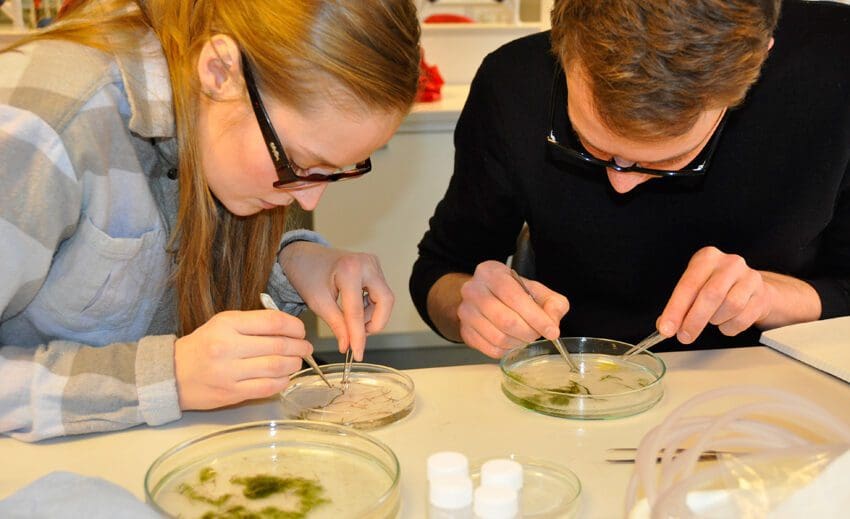AB-823 Light Climate and Primary Productivity in the Arctic (10 ECTS)
ID:
AB-823
CREDITS:
10 ECTS
APPLICATION DEADLINE:
October 15, 2023
START DATE:
April 15, 2024
END DATE:
May 28, 2024
COURSE PERIOD:
Spring semester (April 15th - week 22). Teaching block 3

AB-333/833 students examining plankton samples in the UNIS lab. Photo: Kirsten Christoffersen/UNIS
| Grade: | Letter grade (A through F) |
| Course Cost: | Fieldwork, ca. NOK 1400 (7 days x NOK 200 per overnight stay) |
| Course Capacity Min/Max: | 10/20 students (AB-323/823 in total) |
| Language of instruction: | English |
| Examination support material: | Bilingual dictionary between English and mother tongue |
UNIS contact person:
Course requirements
Enrolment in a relevant PhD programme.
Academic content
This course reviews the main key-environmental variables (light regime, temperature, nutrients, salinity & CO2) affecting marine primary production in the Arctic. We focus on how phytoplankton, sea-ice microalgae and macroalgae are adapted (long term adjustments) and acclimatize (short term adjustments) to variations in the light regime (irradiance, its spectral composition and day length), affected by temperature, salinity and CO2 concentration. We also go through micro- and macroalgal eco-physiology and biodiversity during midnight sun period (April – August) and polar night period (November – February).
Practical work includes taxonomy (microscope, pictures, molecular overview), primary production measurements using fluorescence kinetics to estimate electron transfer rates (e.g. Pulse Amplitude Modulated and Fast Repetition Rage fluorometry), and light absorption and utilization (spectrometers, irradiance meters, spectroradiometer).
Learning outcomes
Students will acquire a deep comprehension of the system ecology and photo-biology of the Arctic micro- and macroalgae and how growth is related to environmental key factors. The combination of complimentary lectures, and field-based practical work will further their understanding of the environmental challenges, especially climate induced differences in time and space. Student-led project work will enhance skills in experimental design and analysis including the demands and limitations of fieldwork in extreme environments. PhD students will have some selected “in-depth tasks” and research papers in addition to the MSc level part of the course.
Upon completing the course, the students will have:
Knowledge
- an overview of Arctic algae eco-physiology in general. Main focus will be to enhance knowledge in processes related to light climate (irradiance, spectral irradiance and day length) and the corresponding photosynthetic activity and growth in micro- and macroalgae
- knowledge about modern optical methods to measure photosynthesis, which will be part of the practical curriculum.
Skills
- an overview of photosynthetic and growth performance of arctic micro- and macro algae
- know how to measure light climate and photosynthesis in the laboratory and in situ.
General competences
- competence in how key environmental variables alters photosynthesis and growth of arctic micro- and macro algae throughout the year
- hands-on competence in measuring light climate and photosynthesis in the laboratory and in situ
- overview of major taxa and pigment groups of Arctic algae.
Learning activities
The course extends over ca. 5 weeks including compulsory safety training, and is run in combination with AB-323.
The lectures are based on literature on algal photosynthesis, general physiology, ecology, and we also focus on differences between various algal classes and pigment groups (chemo-, bio-, optical- and molecular taxonomy). The course also includes laboratory/field exercises in which students study how different algal groups utilize available light for photosynthesis and growth.
Summary
- Total lecture hours: 30 hours.
- Total seminar hours: 8 hours.
- Laboratory work: 30 hours.
- Excursion: 7 days.
Compulsory learning activities
All compulsory learning activities must be approved in order to sit the exam.
- Field excursions
- Laboratory work
- One approved report
- A presentation on a given topic
Assessment:
| Method | Duration |
Percentage of final grade
|
| Written exam | 4 hours | 100% |

